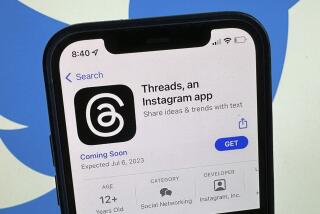Facebook leans harder into Groups as it redesigns main app

- Share via
Facebook Inc. unveiled a redesign Tuesday that focuses on the Groups feature of its namesake social network, doubling down on a successful but controversial part of the big blue app. It’s another sign that Facebook is moving toward more private, intimate communication.
The changes, announced at the company’s annual F8 developers conference in San Jose, make Groups a bigger part of the Facebook user experience. A new design for the Facebook mobile app highlights the groups that users have joined, and it now shows a personalized feed of activity across all the groups people are part of in a special tab. It’s also getting a color change: It will be framed in white instead of the company’s traditional blue.
The changes are Facebook’s biggest in five years, Chief Executive Mark Zuckerberg said onstage at F8. The company has been pushing more aggressively into groups for the last two years as people shy away from posting things publicly and look for more intimate ways to connect with friends and family. Fast-growing meme and community groups have been a recent bright spot for Facebook amid a series of privacy scandals, and the company is also shifting its focus to deal with its own projections that people are spending less time on its namesake site.
“It has a much bigger focus on communities and making communities as central as friends,” Zuckerberg said.
The CEO opened his remarks by reiterating Facebook’s plan to build a privacy-focused social platform. “We don’t have the strongest reputation on privacy right now,” he said. “We need to change the way we’re running the company today.”
Groups, which can be public or private on the social network, can be used to help keep long-distance friends in touch, connect people with similar interests or passions, and organize events. Facebook is also making it easier to discover new groups based on users’ interests, and it will recommend relevant groups to people when they are in other parts of the app, such as Marketplace, the Gaming tab and the Watch video service. People will also be able to share content directly to their groups using the share button on the main News Feed, the same way they do with friends and family, Facebook said.
The company is even rolling out specific features for different types of groups. For example, members in health-related groups can ask the group administrator to post on their behalf to better protect their privacy. Facebook is also adding more chat features for groups focused on gaming.
The growth of Groups makes it more urgent for Facebook to reckon with the spammers, manipulators and hackers that exploit them to spread misinformation and conspiracy theories, among other things. In special counsel Robert S. Mueller III’s indictment of 13 Russian nationals and three Russian entities over interference in the 2016 U.S. election, for example, several Facebook groups were cited as tools to support President Trump’s campaign or oppose Hillary Clinton’s. More recently, Facebook groups have been blamed for amplifying anger and spreading misinformation during violent protests in France. On WhatsApp, an encrypted messaging service owned by Facebook, private groups have been used to spread dangerous misinformation that has led to physical violence and even deaths.
How WhatsApp is battling misinformation in India, where ‘fake news is part of our culture’ »
In March, Zuckerberg said Facebook was undertaking a massive overhaul to focus on private, ephemeral and encrypted communication, saying that more people want to interact privately or in more intimate groups rather than the open-sharing model he built the company around. The company also aims to integrate Facebook’s different online properties, enabling users to send messages between WhatsApp, Instagram and Facebook Messenger.
Facebook also unveiled a slew of other new features Tuesday. The company’s Dating service is getting a new feature called Secret Crush that lets people “express interest in” as many as nine of their Facebook friends. If those friends have opted into Facebook Dating, they will get a notification saying someone has a crush on them. If any of those friends adds the original admirer to their Secret Crush list, Facebook makes a match — digitally, at least. Facebook Dating, which was announced at last year’s F8, is still free to users.
Menlo Park, Calif.-based Facebook is also trying to facilitate non-romantic relationships. A Meet New Friends feature will make recommendations based on some shared connection — such as living in the same city or working at the same company. It’s opt-in, so users will only see other people who are open to meeting new friends, the company said. It will also be integrated into Facebook Groups.
The social network’s e-commerce service, Marketplace, also is getting an upgrade. People who sell goods on Marketplace will soon be able to take payment directly through Facebook, including shipping costs, the company said. Today, people who sell goods have to arrange payment outside of Facebook, though they can do so via Facebook’s messaging app Messenger.
PayPal Holdings Inc. will process payments for purchases made directly inside Marketplace, according to a company spokesperson. That’s the same payments partner Facebook’s Instagram is using to process in-app purchases. Facebook also said it was considering charging sellers a fee for facilitating these deals.
“We are evaluating a selling fee that is in line with competitive platforms to help cover payment processing and programs such as purchase protection,” a spokesperson said.
Also on Tuesday, Facebook said its Oculus virtual reality division will start shipping its new Quest and Rift S headsets on May 21.
The Quest is Facebook’s second attempt at a stand-alone VR headset, while the Rift S is an updated version of Oculus’ classic headset that attaches to a high-end gaming PC. Both devices cost $399. The Rift S has improved straps and better visuals than its predecessor, while the Quest features far better performance than the Oculus Go, Facebook’s first completely wireless VR goggles.
In a test, the Oculus Quest was fast to set up, had a clean virtual reality interface, and was comfortable to wear. It synchronizes with a mobile app, like previous Oculus headsets, to load games and set preferences.
The Quest adds Oculus’ Guardian feature, which sets up virtual boundaries to prevent a person from bumping into real world objects while wearing the headset. It also includes the same controllers as the Rift S, and integrated camera sensors so the device can better sense the external environment.
The Rift S will be able to play more than 1,000 games already available for the earlier Rift, while the Quest headset will be compatible with about 50 apps and games at launch.
The market for VR and augmented reality headsets is forecast to grow 54% this year to 8.9 million units, according to market researcher IDC. Sales of stand-alone headsets like the Quest will account for 59% of the total market for VR devices by 2023, IDC said.
More to Read
Inside the business of entertainment
The Wide Shot brings you news, analysis and insights on everything from streaming wars to production — and what it all means for the future.
You may occasionally receive promotional content from the Los Angeles Times.










